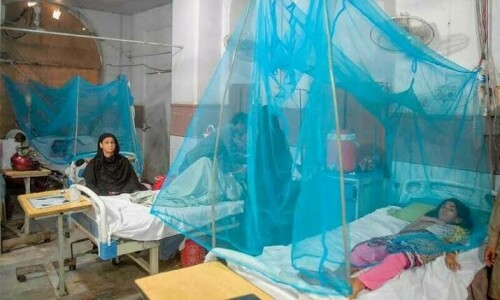Islamabad, Apr 27, 2025: Climate change is significantly exacerbating the spread of malaria in Pakistan, which is now facing over 2 million cases annually, as stated in a joint alert by the World Health Organization (WHO) and Pakistan’s Ministry of National Health Services.
This warning, issued on World Malaria Day, sheds light on the growing strain of the disease and stresses the need for unified efforts to address its escalation.
The global theme for World Malaria Day by the WHO, “Reinvest, Reimagine, Renew,” highlights the necessity for increased investment and a renewed commitment to the eradication of malaria.
Both the WHO and Pakistan have urged enhanced collaboration among all stakeholders to ensure that limited resources do not hinder the battle against malaria.
The fight against malaria in Pakistan has been further complicated by the disastrous 2022 floods, which contributed to 6.6 million new malaria cases between 2022 and 2024.
The latest figures reveal a dramatic rise to 2.7 million malaria cases in 2023, compared to just 399,000 in 2021.
The WHO Eastern Mediterranean Region, which includes Pakistan, recorded a total of 12 million malaria cases in 2023, reflecting a staggering 137% increase since 2015.
However, significant advancements have been made in the prevention and treatment of malaria. In 2024 alone, Pakistan screened over 11.4 million suspected cases and treated 2 million confirmed cases, with notable support from the WHO and the Global Fund to Fight AIDS, Tuberculosis, and Malaria.
Moreover, more than 7.8 million insecticide-treated nets have been distributed across high-risk areas, up from 2.7 million in 2023.
The WHO has expressed optimism about Pakistan’s commitment to fighting malaria, underscoring that the eradication of the disease is attainable if all involved parties invest and collaborate in strengthening response systems, particularly in the face of climate-related challenges.
Data from 5,575 health centers in 80 affected districts shows a sharp rise in malaria cases, which is directly linked to climate change factors such as rising temperatures and recurrent floods.
These environmental changes, compounded by poverty, inadequate healthcare access, and security issues in regions like Balochistan, Khyber Pakhtunkhwa, and Sindh, have intensified the malaria crisis.
Current evidence supports the success of malaria control efforts.
Read More: Karachi Heat Wave Continues, Temperatures Reach 38°C
However, experts emphasize that sustainable and coordinated strategies are crucial to mitigating the effects of climate change and ensuring the long-term health of Pakistan’s population.
As the nation faces these escalating challenges, the WHO and Pakistan’s government have reiterated their dedication to saving lives and ensuring a healthier future.
This urgent call to action highlights the need for both local and international cooperation to tackle the intertwined dangers of malaria and climate change.
